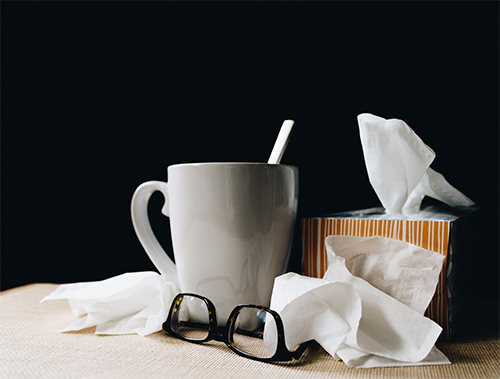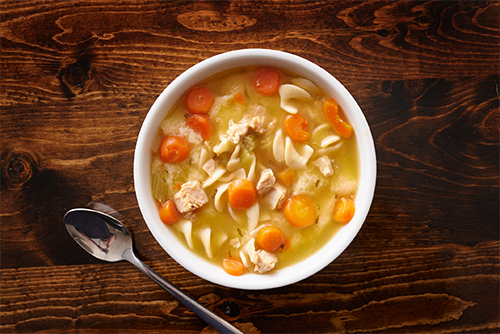The average American catches two or three colds a year, and kids have them more frequently, according to the CDC. That means that, even with frequent hand washing, avoiding sick people, and other recommended ways to prevent colds, it’s possible and even likely you’ll find yourself coughing, sniffling, and dealing with a cold at some point this winter. (We are so sorry.)
If and when a cold hits you or your family, follow this advice from experts on how to lessen its length and severity.
Hydration is key

Not feeling well? Drink, drink, drink. All the physicians with whom we spoke stressed that drinking plenty of fluids is often the best thing you can do when you have a cold.
“Water and fluids are strong medicine,” says Dr. Geeta Maker-Clark, family physician in the NorthShore University HealthSystem Integrative Medicine Department.
She says that plain water, diluted juice, and/or broth are all good options, but drinking warm lemon water with honey is her favorite way to stay hydrated when fighting a cold. Dr. Brunilda Nazario, WebMD.com medical director, favors hot tea with ginger and honey.
Not all liquids are helpful, however. Avoid coffee and caffeinated sodas, as well as alcohol. “Alcohol is not a great idea when you’re sick. Not only does it dehydrate you, it can also suppress the immune system,” explains Maker-Clark.
Try these helpful home remedies

Chicken soup
Turns out Grandma was right! “There is a lot of wisdom around soup,” says Maker-Clark, who notes that it doesn’t overwhelm the digestive system but still provides some protein and sustenance to keep you from getting weak. She says people who eat garlic have been shown to have fewer colds, so adding chopped and lightly sautéed garlic to your vegetable soup is a good idea. Ginger can also be a good addition. Grate your own fresh to also get the aromatic benefits.
Gargling with salt water
Several doctors recommended gargling three to four times a day with a salt water mixture made with one teaspoon of salt with a half cup of water for relief from a sore throat.
Humidifying the air
Colder weather and forced heat mean much dryer air, but adding moisture to the air can have several benefits. “Adding humidity can loosen congestion, making it easier to breathe, and makes it less likely for mucous membranes to crack, which is one way a virus can enter the body,” explains Maker-Clark.
Saline nasal rinse
Nazario recommends saline nasal rinses, especially for people with sneezing. She says that they “help reduce the amount of cold viruses in your nose and may hasten your recovery” as well as “help prevent colds from spreading.”
Menthol rub
Another option is trying a menthol vapor rub, like Vicks VapoRub. “It really does magic,” says Dr. Rahul Modi, physician at Advocate Health Care. He cautions that it may not work on the very first application and that users should give it some time to alleviate cold symptoms.
What about over-the-counter cold medications?
Desperate for relief, cold sufferers head to the drug store, but over-the-counter (OTC) medications may not be the hoped-for panacea.
“I don’t find that OTC cold and cough medications are helpful. The research does not show that they prevent or shorten colds and they often have side effects that people don’t appreciate,” says Maker-Clark, who says adults can often manage to alleviate symptoms in other ways.
However, Dr. Jack Franaszek, a physician at Northwestern Immediate Care, says that OTC cough suppressants may be helpful when it comes to an annoying cough that just won’t subside.
Nazario warns against using OTC cold and cough medications in children because they can cause serious and even life-threatening side effects. “Talk with your child’s doctor before giving any medications,” she says.
Do supplements and vitamins help?

Modi says that while the research may not conclusively show a direct link between taking vitamin C and zinc and an improvement in cold symptoms, he has seen some benefit in patients who take them at the first onset of cold symptoms.
“Timing matters,” he says, noting that it’s important to take both “at the start of the symptoms, when you’re first starting to feel under the weather. If you wait a few days, they won’t help.”
Nazario says that vitamin C “could help cut down on a few sick days.” Franaszek notes that vitamin C won’t do much when taken after you have a full-blown cold, but says that it “may be a little helpful if taken on a daily basis before symptoms start” and to ensure that, you likely need to take it every day.
She cautions against using a zinc nasal spray, however, because “it can damage cells in your nose and hasn’t been proven effective.” Zinc lozenges three or four times a day may help a little bit to shorten the duration of the cold by a day or so, but should not be taken in the long term.
If you want to try zinc, Maker-Clark recommends zinc elderberry lozenges.
Should you stay home?

If you have a fever, yes.
If you are fever-free and you feel up to it, it’s OK to leave the house, but please take steps to keep from spreading germs to others. In addition to frequently washing your hands, if you have a cough, wear a mask when you go out.
Staying home is beneficial because it allows you to rest. It’s OK to curl up on the couch with tea and Netflix, but Modi says, “Rest is crucial when you’re not feeling well. But do the other things — don’t just be a bum. Start taking care of yourself with fluids and home remedies and, if you want, over-the-counter medication.”
Maker-Clark warns that failing to rest has consequences. “Your cold will likely last longer than it would otherwise.”
Ease up on exercise
Does the emphasis on rest mean skipping your workout? Probably. “Avoid the kind of exercise that leads to intense sweating or exhaustion. I would opt for a walk if you feel the need to get some fresh air, but this is really, truly a time for restorative rest,” says Maker-Clark.
Are antibiotics a good idea?
Colds are caused by viruses, and antibiotics treat bacterial infections, not viral infections. The physicians all agreed that antibiotics are not going to help cold sufferers. Not only are they not helpful in treating a cold, but using them can also have negative effects, according to Dr. Sameer Patel, pediatric infectious disease specialist at Ann & Robert H. Lurie Children’s Hospital of Chicago and associate professor of pediatrics at Northwestern University Feinberg School of Medicine.
The rise of antibiotic resistance is a huge issue. In addition, those taking an antibiotic can have allergic reactions or suffer other side effects and complications.
Patel explains that in the past, doctors often prescribed antibiotics “just in case” they were helpful. Now, however, there are far fewer bacterial infections than there used to be, meaning they are far less likely to be helpful.
“Understand that when the doctor doesn’t give a prescription for antibiotics, it’s most likely a viral infection. But also feel free to communicate with your doctor. If you get a prescription, it’s OK to ask what is this for and if it is really needed. If you don’t get one, you can ask what you should monitor for in case you really do need it,” advises Patel.
While some people with a bad cold are tempted to open the medicine cabinet and take what they have, Nazario cautions that this is not the time to finish off an old antibiotic in the cabinet.
When do you know it’s gone beyond a basic cold? When should you seek medical attention?
The CDC recommends calling your doctor if you or the person for whom you are caring has had symptoms for more than 10 days, or symptoms that are severe or unusual, or if your child is younger than three months of age and has a fever or is lethargic. Nazario recommends reaching out to your doctor if you have a fever greater than 103, or a fever for more than three days.
With children, Patel suggests at least calling the pediatrician if on the third day your child’s symptoms are becoming more severe, such as a rising fever or worsening cough and to call at any point if the child has difficulty breathing or is acting out of character.
Franaszek says that a very high fever and cough can suggest flu and you should reach out to your doctor in that circumstance because flu medicines may be helpful to lessen the duration.
Hopefully, however, these tips will not only keep you from needing the doctor but will have you and your loved ones feeling better as soon as possible.
More from Make It Better:
- The 8 Best Teas for Your Health
- 8 Ways to Avoid the Afternoon Slump
- The Best and Worst Foods for Better Sleep
 Shannan Younger is a writer living in the western suburbs of Chicago with her husband and teen daughter. Originally from Ohio, she received her undergraduate and law degrees from the University of Notre Dame. Her essays have been published in several anthologies and her work has been featured on a wide range of websites, from the Erma Bombeck Humor Writers Workshop to the BBC. She also blogs about parenting at Between Us Parents.
Shannan Younger is a writer living in the western suburbs of Chicago with her husband and teen daughter. Originally from Ohio, she received her undergraduate and law degrees from the University of Notre Dame. Her essays have been published in several anthologies and her work has been featured on a wide range of websites, from the Erma Bombeck Humor Writers Workshop to the BBC. She also blogs about parenting at Between Us Parents.
Shannan is the Illinois Champion Leader for Shot@Life, a campaign of the United Nations Foundation that supports vaccination efforts in developing countries to ensure life-saving vaccines reach the hardest to reach children. “Vaccines are one of the most effective ways to save the lives of children in developing countries and I’d love nothing more than to see diseases eradicated,” Shannan says. “We are so close to getting rid of polio for good!”

